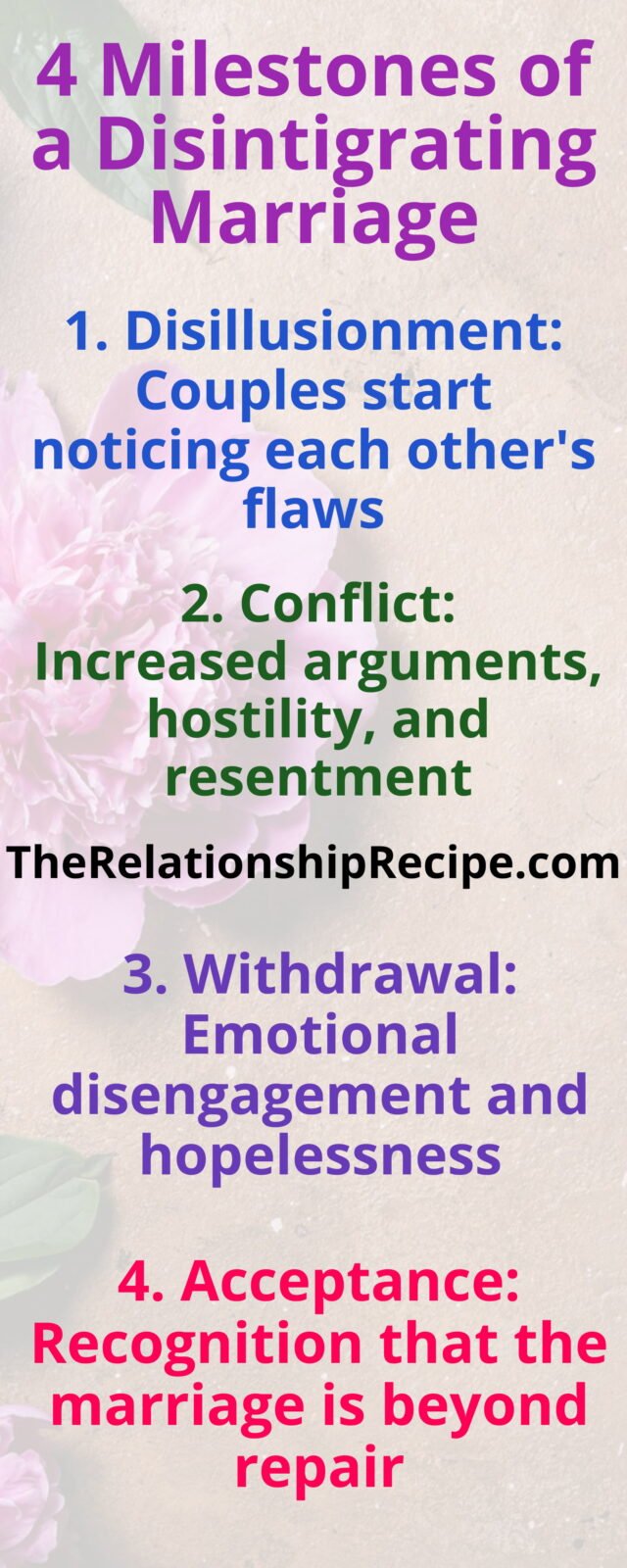I remember the day I realized my marriage was imploding like it was yesterday.
The sun was casting its warm glow through the living room window, but the atmosphere within was anything but serene. My husband and I were entangled in yet another conflict, a recurring theme that had become the unwelcome backdrop to our marriage.
The argument started innocently enough, a seemingly trivial disagreement that took an unexpected turn. It wasn’t the content of our dispute that struck me, but the way we handled it — or rather, the lack of handling. The air thickened with tension, words became weapons, and communication turned into a battlefield. It was a familiar script, one we had unknowingly rehearsed countless times before.
What struck me most wasn’t the disagreement itself, but the stark realization that accompanied it. It was a pivotal moment, a heartbreaking acknowledgment that we were stuck in a cycle of unresolved conflicts. The words we exchanged weren’t just fleeting expressions of frustration; they were echoes of deeper issues that we were failing to address. Our marriage, once built on dreams and promises, seemed to be crumbling under the weight of unspoken grievances.
As the argument escalated, I couldn’t help but see the pattern. We were like ships passing in the night, our connection eroding with each unspoken word. It wasn’t about the dishes left in the sink or the misplaced car keys; it was about the growing emotional distance between us. The argument became a poignant metaphor for the widening gap in our relationship — one that, with every passing dispute, seemed more challenging to bridge.
The realization hit me like a ton of bricks: this wasn’t just a rough patch; it was a fundamental breakdown in our connection. The argument served as a catalyst for a deeper understanding, a painful admission that our communication had become a breeding ground for resentment. The wounds we inflicted with our words weren’t healing; instead, they were forming scars that marred the landscape of our marriage.
Every marriage takes on a unique journey, facing its own set of challenges and triumphs. However, when love wanes, and cracks begin to appear, many marriages follow a common trajectory towards disintegration. Recognizing the stages of this trajectory can be both insightful and empowering, allowing couples to understand their situation, navigate challenges effectively, and ultimately make informed decisions about their future.
This guide explores the four key stages of a disintegrating marriage: Disillusionment, Conflict, Withdrawal, and Acceptance. Each stage presents its own distinct set of characteristics, highlighting the gradual erosion of trust, intimacy, and ultimately, the very foundation of the relationship. By understanding these stages, couples can gain valuable insights into their own situation, identify areas for improvement, and take proactive steps to address underlying issues.
Whether seeking to rekindle the flame of love or navigate the difficult waters of separation, understanding the stages of a disintegrating marriage can be a valuable tool for self-reflection, communication, and ultimately, personal growth. Click here to read more on signs of a failing marriage.
These stages include:
1. Disillusionment: The Dream Fades
Disillusionment marks the first stage where the idealizations and rose-tinted glasses of the early marriage begin to fade. Couples start noticing each other’s flaws, quirks, and habits that were previously overlooked or romanticized. This initial awareness of discrepancies between expectations and reality can be quite jarring, leading to feelings of disappointment, frustration, and even anger.
Key features of the disillusionment stage:
- Heightened awareness of flaws: Partners become more attuned to each other’s previously ignored flaws, leading to increased criticism and judgment.
- Shifting expectations: The romanticized expectations of the honeymoon phase begin to clash with the realities of daily life and shared responsibilities.
- Increased communication challenges: Effective communication can become strained, with couples struggling to express their concerns and disappointments constructively.
- Loss of intimacy: The emotional and physical intimacy that characterized the early stages of the relationship may begin to decline as couples feel less connected and more critical of each other.
- Rise of conflict: Disagreements and arguments become more frequent as partners struggle to navigate their newfound awareness of differences and unmet expectations.
Navigating the Disillusionment Stage:
This stage can be an important turning point in a marriage. While it presents challenges, it also offers an opportunity for couples to:
- Embrace reality: Acknowledge that no relationship is perfect and accept each other’s flaws and imperfections.
- Reassess expectations: Reevaluate and adjust their expectations for the marriage based on the reality of their individual differences and shared experiences.
- Improve communication: Develop healthier communication patterns that involve active listening, empathy, and expressing needs assertively.
- Seek professional help: Consider seeking guidance from a therapist to learn conflict resolution skills and rebuild intimacy.
By addressing the disillusionment phase head-on, couples can lay the foundation for a stronger, more authentic relationship based on mutual understanding and acceptance.

2. Conflict: The Storm Brews
As disillusionment deepens, the previously masked issues and unmet needs escalate into open conflict. This stage is characterized by increased arguments, hostility, and resentment as couples attempt to resolve their differences, often through unproductive and harmful communication patterns.
Hallmarks of the conflict stage:
- Increased frequency and intensity of arguments: Disagreements become more frequent, heated, and emotionally charged.
- Escalation of criticism and negativity: Communication becomes dominated by criticism, blame, and hurtful language, eroding trust and understanding.
- Lack of constructive conflict resolution: Couples struggle to engage in healthy conflict resolution techniques, resorting to unproductive strategies like yelling, stonewalling, or withdrawal.
- Emotional distance: The emotional connection between partners weakens due to constant conflict, leading to feelings of isolation and loneliness.
- Power struggles and control issues: Attempts to control the situation and push personal agendas further fuel the conflict and exacerbate tensions.
Navigating the Conflict Stage:
While conflict is inevitable in any relationship, it doesn’t have to lead to destruction. To navigate this challenging stage, couples can:
- Develop healthy communication skills: Learn to express concerns constructively, listen actively without judgment, and focus on finding solutions collaboratively.
- Identify and address underlying issues: Explore the root causes of the conflict, such as unmet needs, unresolved grievances, or incompatible values.
- Practice conflict resolution techniques: Learn and implement fair and effective conflict resolution strategies, such as “I” statements, active listening, and compromise.
- Seek professional help: Consider seeking guidance from a therapist specializing in conflict resolution and couples therapy to guide them through communication challenges and rebuild healthier patterns of interaction.
By focusing on communication, understanding, and addressing the underlying issues, couples can transform the conflict stage into an opportunity for growth, strengthening their relationship through collaboration and shared solutions.

3. Withdrawal: The Walls Go Up
When the storm of conflict continues without resolution, the relationship enters a phase of emotional disengagement and withdrawal. This stage is marked by a pervasive sense of despair and hopelessness, leading to a disintegration of emotional intimacy and shared connection.
Key characteristics of the withdrawal stage:
- Emotional disconnection: Partners withdraw emotionally from each other, experiencing decreased affection, warmth, and responsiveness.
- Reduced communication: Communication becomes limited and superficial, focusing on practical matters rather than deeper emotional connection.
- Loss of shared activities: Couples stop engaging in shared activities and hobbies, further increasing their emotional distance and sense of isolation.
- Diminished physical intimacy: Sexual intimacy and physical affection decrease significantly, reflecting the emotional withdrawal and declining connection.
- Increased individual pursuits: Partners focus on their personal activities and interests, neglecting the relationship and prioritizing personal fulfillment over shared experiences.
Navigating the Withdrawal Stage:
The withdrawal stage can be a critical turning point, pushing the relationship closer to the brink of disintegrating. However, with awareness and commitment, couples can still work towards repair:
- Seek to understand the reasons for withdrawal: Explore the underlying reasons for withdrawing, such as fear of conflict, emotional pain, or a lack of hope for the relationship.
- Initiate open and honest communication: Re-establish communication channels, even if it starts with small gestures like acknowledging each other’s presence or initiating simple conversations.
- Focus on rebuilding emotional intimacy: Engage in activities that promote emotional connection, such as sharing feelings, offering support, and expressing appreciation.
- Consider couples therapy: Seek professional guidance from a therapist specializing in couples therapy to address the root causes of withdrawal and develop strategies for rebuilding trust and emotional closeness.
By taking initiative and addressing the underlying issues, couples can emerge from the withdrawal stage and pave the way for a more connected and fulfilling relationship.

4. Acceptance: The Disintegrating Foundations
In the final stage of the disintegrating process, couples reach a state of acceptance. The disillusionment, conflict, and withdrawal have eroded the foundation of the relationship, leaving behind a sense of resignation and a recognition that the marriage is beyond repair.
Key features of the acceptance stage:
- Loss of hope for the relationship: Both partners acknowledge that they have exhausted all efforts and no longer believe in the possibility of reconciliation.
- Emotional detachment: The emotional connection between partners completely disintegrates, leaving behind feelings of indifference or even animosity.
- Focus on practicalities: Conversations primarily revolve around logistical matters surrounding separation or divorce, such as dividing assets, child custody arrangements, and financial settlements.
- Grief and loss: Both partners experience varying degrees of grief and loss associated with the end of their marriage and the life they had envisioned together.
- Planning for the future: Couples begin to plan their separate lives after the marriage dissolves, including housing arrangements, financial independence, and new relationships.
Navigating the Acceptance Stage:
While accepting the disintegrating of a marriage can be painful, it also represents an opportunity for closure and individual growth:
- Seek support: Surround yourself with supportive friends, family, or a therapist to help process the grief, manage emotions, and navigate the transition.
- Prioritize self-care: Focus on activities that promote physical and mental well-being, such as exercise, healthy eating, and relaxation techniques.
- Address legal and financial matters: Seek legal counsel and financial advisors to ensure a fair and equitable separation or divorce agreement.
- Focus on individual growth: Take time to rediscover your interests, pursue personal goals, and invest in building a fulfilling life for yourself.
By accepting the inevitable and prioritizing self-care, couples can move forward from the disintegration of their marriage and build a brighter future for themselves individually.

Embracing the New Horizon: Moving Forward from Marriage Disintegration
While the disintegration of a marriage can be a deeply painful experience, it also presents an opportunity for individual growth and a renewed sense of self. By acknowledging the inevitable and prioritizing self-care, couples can navigate this challenging transition with grace and courage.
Focus on nourishing your physical and mental well-being through healthy habits, activities you enjoy, and seeking support from loved ones or a therapist. Address any legal and financial aspects of the separation or divorce with clarity and fairness. Most importantly, invest time in rediscovering your own passions and aspirations, pursuing personal goals, and building a fulfilling life that reflects your individual needs and desires.
Remember, the ending of a marriage doesn’t mark the end of your story. It is merely a chapter in a larger narrative, one that holds the potential for new beginnings, self-discovery, and a brighter future. Embrace the lessons learned, celebrate your resilience, and step forward with confidence and hope as you create a fulfilling life for yourself beyond the confines of a disintegrating marriage.

https://www.thecouplescenter.org/stages-and-signs-of-a-dying-marriage/
This post may contain affiliate links. I earn from qualifying Amazon purchases at no extra cost to you.




